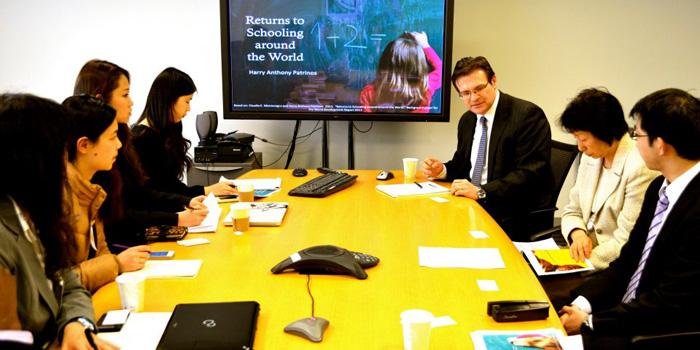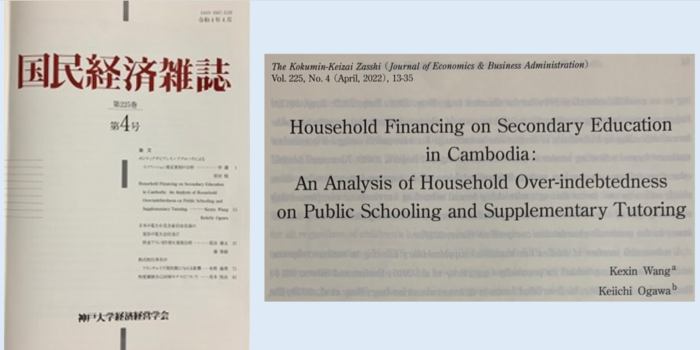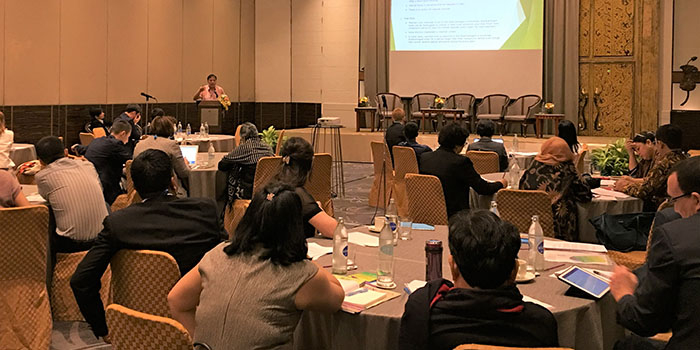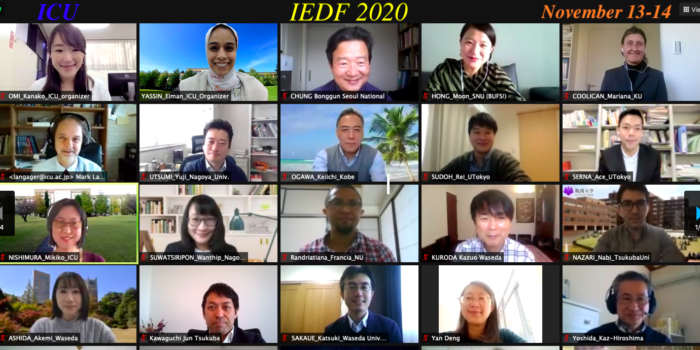Participation in this US field study is one of the most informative and rewarding experiences I have ever had. It was interactive, eye-opening and stimulating. Personally, I am much grateful to Professor Ogawa for encouraging us to make presentations in Comparative and International Education Society (CIES) conference and for arranging so many brilliant meetings with education and development experts from international organizations such as World Bank (WB) and Inter-American Development Bank (IDB) for us. Short as it was, I learned a lot from this two-week experience. Now as I look back on those days in New Orleans and Washington DC, I have so much to share.
CIES conference in New Orleans
 Participation in the 57th Comparative and International Education Society conference as a presenter has special meaning for me. Not only is it my first conference presentation, but also it is an official declaration of my academic pursuit. And judging from my performance during the panel week, I think I did a good job. It was a very good start.
Participation in the 57th Comparative and International Education Society conference as a presenter has special meaning for me. Not only is it my first conference presentation, but also it is an official declaration of my academic pursuit. And judging from my performance during the panel week, I think I did a good job. It was a very good start.
My proposal for this conference is on grade repetition in Uganda primary schools and the final presentation is based on preliminary findings of my master thesis in Kobe University. The presentation was scheduled on Monday 1:45 – 3:15 p.m. in the “Education for All and Millenium Development Goals” panel.
To be frank, I had started to feel like shrinking back before the conference. Though I had been working on this research for the last semester and had already completed a drafted paper, Neither did I have sufficient time to prepare for the presentation before the conference, nor in the mood of doing it due to the complicated and exhausting US visa issue. What’s more worrying, my presentation was scheduled on Monday 1:45 – 3:15 p.m., the first day of the panel week, in the “Education for All and Millenium Development Goals” panel with well-known Professor Keith M Lewin from UK, senior education specialist Ramachandra Rao Begur at UNICEF India, Ph.D Mary Chandy Vayaliparampil who had just graduated from Penn State University and Stephanie DeGonda, who had come back from international fieldwork in many developing countries to be a master student in New York University. As it appeared to me, not only I was the youngest but also the only one unprofessional. I was much concerned with the possibility that I might embarrass myself in front of them.
However, as it turned out, I was more blessed than I had expected. In fact, I think it was the best presentation that I had ever delivered. I got myself dressed in a suit so that I looked nice and full of confidence. I went through the powerpoints several times to be as familiar with the contents as possible. When it was finally my turn and I walked up in front of my audience, I didn’t feel nervous or retreating. Instead, I was excited to have the chance to present what I had been working on so dedicatedly in Kobe and curious to find out if there would be anyone who was also interested in my topic. Then I just followed my powerpoints and talked about those ideas I had in mind. I was completely concentrated on my presentation for fifteen minutes, during which I caught sight of my audience giving me very supportive smiles or seriously thinking about my research. It felt awesome! I got all those scholars quietly listening to my ideas! This was authentic academic communication!
When I closed my presentation with a sincere “thank you” and a confident smile, I received a big applause from the floor. Though we didn’t have time for Q & A after all five presentations were done, some attendees did come up to me and confirmed that I had done a good job. One scholar from University of New England told me that he was impressed by my presentation and spoke highly of the quantitative analyses I had done. Professor Lewin also offered me his name card and asked me to send him an e-mail so that he would provide me with reports they had produced related to my research. I was so excited and motivated by their supportive words, which would surely drive me to further improvement! Toward the end, Wang-san and I luckily had a picture taken with Professor Lewin (see the left).
Apart from making my own presentation, I participated in other panels as well, especially panels including presenters from international organizations such as UNESCO, UNICEF, World Bank and FHI360. As I see it, there was a trend of using quantitative analyses. Most of the presenters from these organizations were good at visualizing data and establishing statements based on rigorous analyses. Since my career goal is to work for international organizations, I am determined to work hard on those skills. Besides individual presentations, the New Scholars Essentials series were quite helpful, particularly “Tips for Writing and Publishing”, “Delivering Effective Academic Presentations” and “Professional Qualifications for Non-academic Jobs”.
I felt happy and proud of myself presenting a paper on CIES conference because there were few master students making a presentation, mostly doctor students or professors. I shall also encourage my fellow classmates to participate in such an international conference which is highly diversified in terms of nationalities, ages, education backgrounds and professions of participates, and which is inclusive to new ideas and young students. Surely, I will participate in next year’s event to be held in the city of Toronto, Canada.
Visits to International Organizations in Washington DC
 Our meetings with experts at Word Bank (WB), Inter-American Development (IDB) and Family Health International 360 (FHI360) were awesome! Firstly, we had the chance to see the working environment at these international organizations, which was truly impressive in terms of the nice offices, cafeteria services and staff benefits. Secondly, it was such an honor to meet with the education and development specialists and introduce ourselves to them. Last but not least, I learned about the latest development issues around the world through seminars held by the specialists.
Our meetings with experts at Word Bank (WB), Inter-American Development (IDB) and Family Health International 360 (FHI360) were awesome! Firstly, we had the chance to see the working environment at these international organizations, which was truly impressive in terms of the nice offices, cafeteria services and staff benefits. Secondly, it was such an honor to meet with the education and development specialists and introduce ourselves to them. Last but not least, I learned about the latest development issues around the world through seminars held by the specialists.
Personally, I like Dr. Harry Patrinos’ presentation on “Private Returns to schooling” at WB best. Dr. Harry Patrinos is Lead Education Economist at the World Bank. He specializes in all areas of education, especially school-based management, demand-side financing and public-private partnerships. Before our meeting, I read many of his papers and articles. In fact, I like his papers very much for the reason that he has strong points and makes his opinions sound and clear by rigorous analyses. I was also quite interested in school voucher programs, for which Dr. Patrinos has highly recognized reputation. After his presentation, I had the chance to raise questions on returns to schooling and school voucher program.
Meeting with Educational Principal Specialist Dr. Jesus Duarte at IDB was also rewarding. I had always been curious how a bank could be involved in education development. Thanks to this visit, I understand how they work it out now. As Dr. Jesus Duarte explained, IDB is a development bank, which is quite different from a commercial bank. IDB continuously supports efforts by Latin America and the Caribbean countries to reduce poverty and inequality, with the aim to bring about development in a sustainable, climate-friendly way. In other word, IDB does not lend money at request for whatever reason. At request, IDB would evaluate the conditions of the country in question and find out the most cost-effective way to facilitate its improvement.
At FHI360, we had a wonderful time with Vice President John Gillies and a number of staff from different teams. Most of them are young, nice and passionate about their work at FHI360. We had a wonderful time together introducing ourselves to each other and sharing interesting experiences. I was very surprised to know that most of them hadn’t majored in education back in college but got involved in the education area from some work or volunteer experiences and found themselves much interested in this area.
Other Memorable Events
Apart from participation in conference and meetings with experts, I took the chance to travel around as well. Traveling is one of the best ways to learn about the culture and the people of a country. New Orleans is well-known for French Quarter influenced by its French colonial history, the origin of Jazz music, and various sea foods. Ogawa sensei took us on an evening tour around French Quarter and we had a fantastic time trying oysters and listening to Jazz by Mississippi. Washington DC is the capitol city of the US and its political center as well. There are numerous museums of great reputation, among which I visited Air and Space Museum, Natural History Museum. Of course, Capitol Hill, Library of Congress, the White House, the Washington Monument and Lincoln Memorial were also the most important cites where I left my footprints.
All in all, thanks to this field study, I have had the chance to set foot on the dream land of many and unveil culture and life here by myself.
Related








